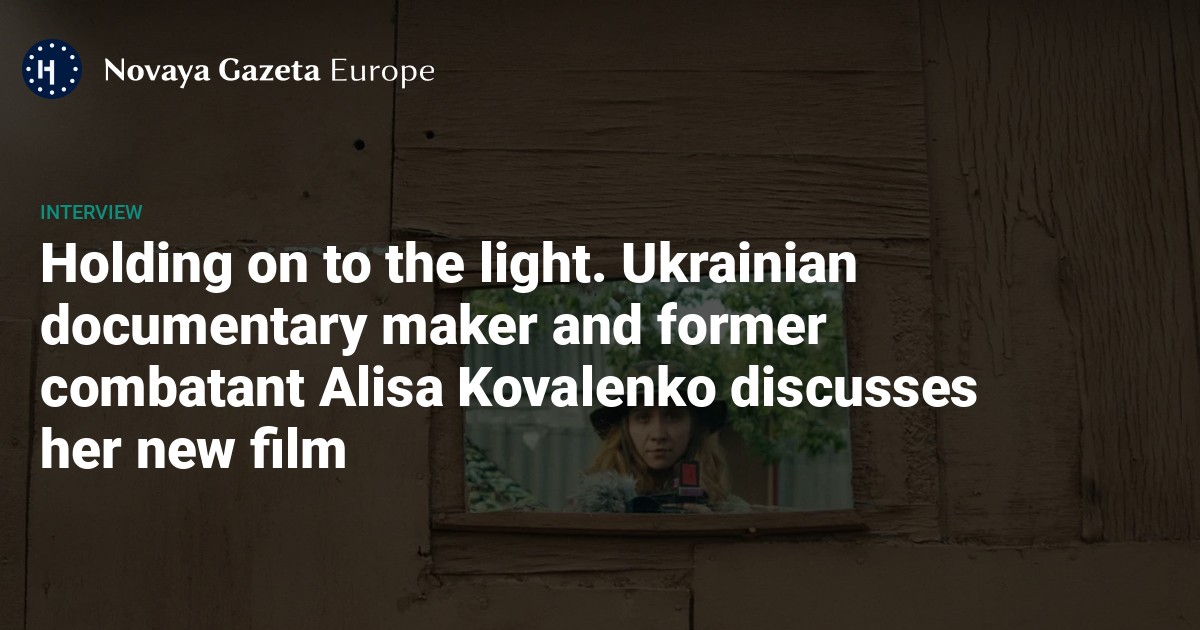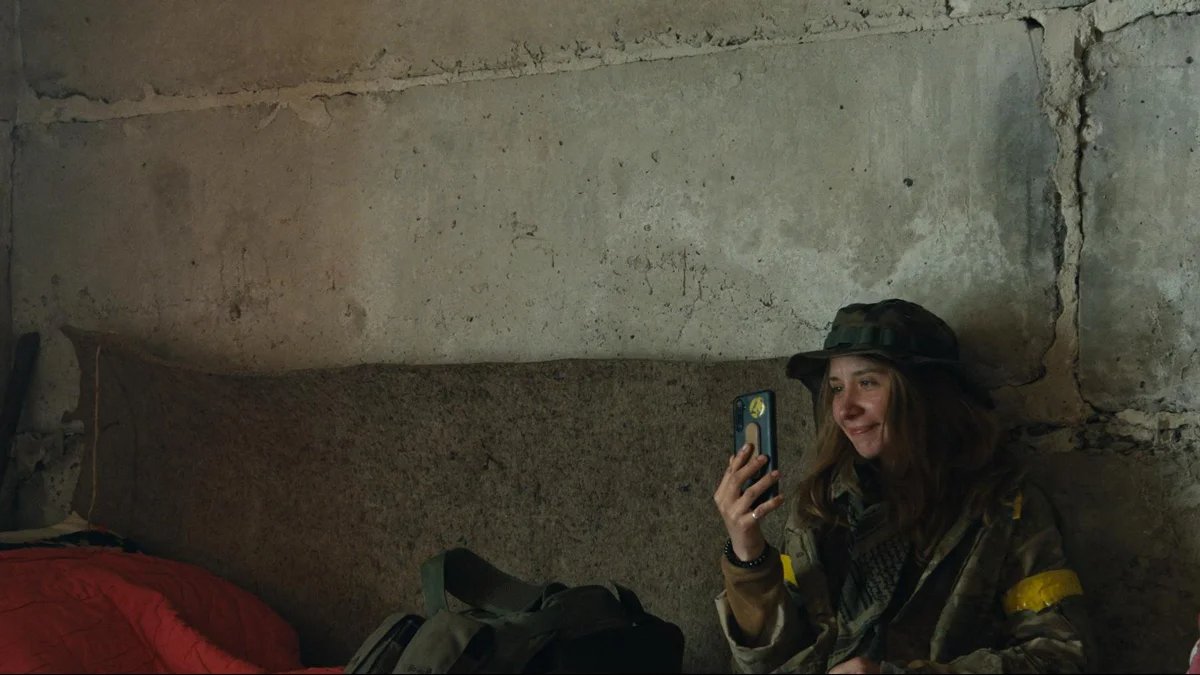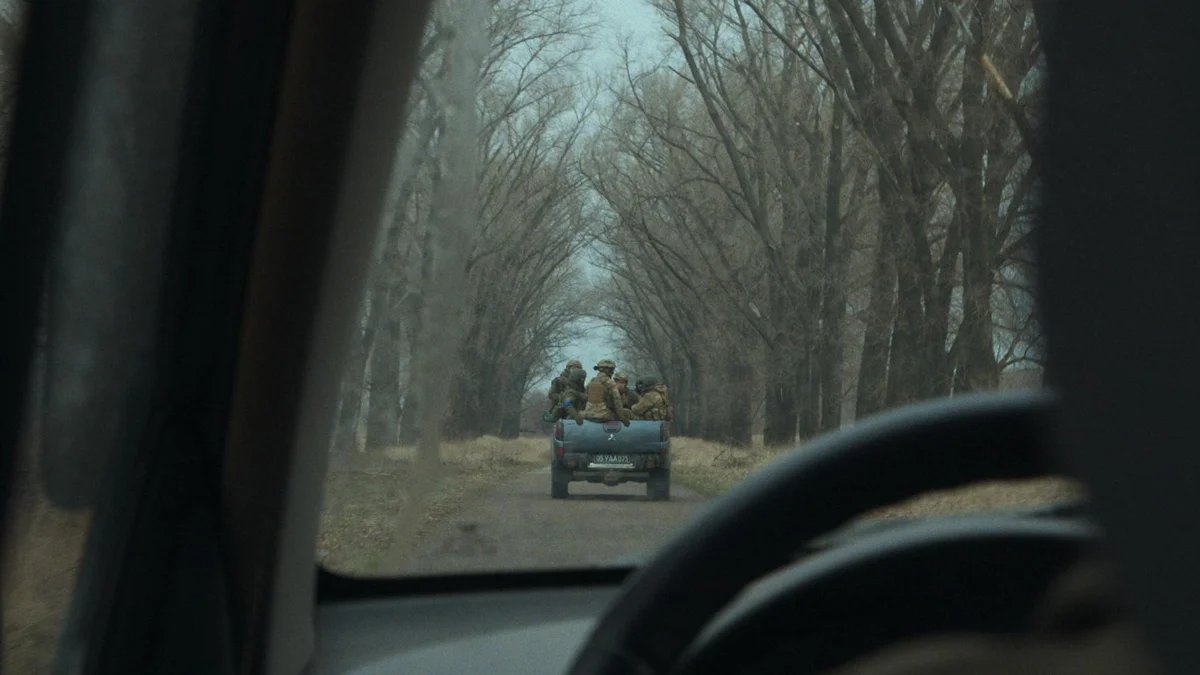



Born in southeastern Ukraine’s Zaporizhzhia region in 1987, Alisa Kovalenko studied documentary filmmaking in Kyiv and Poland and released her debut short in 2014, coinciding with Russia’s illegal annexation of Crimea and the beginning of its proxy war in Donbas.
It was also during that year that Kovalenko was abducted by the Russian military while filming in eastern Ukraine’s Donetsk region. Accusing her of being a Ukrainian sniper, a Russian officer interrogated her for hours and subjected her to sexual violence for several days, after which she was released.
Kovalenko’s autobiographical documentary Alisa in Warland, which she co-directed with Lyubov Durakova, premiered in 2015 and explored the trauma she suffered during her abduction. Her harrowing experience also inspired a subsequent documentary about five Ukrainian teenagers. However, after the Russian invasion of Ukraine began while she was shooting the documentary in Donbas, the project took a dark turn.
Remaining in the war zone for six days where she witnessed the rapid Russian advance, Kovalenko describes feeling “powerless as a documentarian” when two of the film’s protagonists went missing. In response, Kovalenko decided to join the army and enlisted in an assault unit of the Ukrainian Volunteer Army, part of the Ukrainian Territorial Defence Forces. In doing so, she was keeping a promise she had once made to herself that if war ever came to Ukraine, she’d “fight not with my camera but with a gun.”
Kovalenko fought for four months in the Kyiv and Kharkiv regions, and only returned to making her documentary when her unit was disbanded. In 2023, what turned out to be a very different film, We Will Not Fade Away, premiered at the Berlin Film Festival.
Her latest film, My Dear Théo, is a lyrical war diary, and premiered at this year’s Copenhagen International Documentary Festival. The film consists of three interwoven layers of footage: Kovalenko’s own video diary from the front; everyday moments with her eight-year-old son Théo; and dozens of messages she recorded for Théo from the front in case she didn’t return, in which she reflects on life, death, love, forgiveness, memory and hope.
“I wrote those letters with the future in mind. If I didn’t make it back and he grew up full of questions, who would answer them?”
Kovalenko is now working on a new documentary project, Traces, in which she investigates the sexual violence Ukrainian women have been subjected to at the hands of occupying Russian forces. Kovalenko has said that she hopes her work and her willingness to speak out will help the thousands of other victims of Russian sexual violence in Ukraine to feel less alone. Kovalenko spoke with Novaya Gazeta Europe about her experiences making My Dear Théo.
NGE: Has Théo seen the film? How did he react?
AK: He’s seen it five times already — including the world premiere. But before that, we did a private screening for him at Kino 42 in Kyiv, just for family. Me and Stéphane — his father, my partner, and the film’s producer — sat on either side of him and held his hands. Théo really engaged with it and had questions about almost every scene: “I don’t remember that book,” or “I do remember this,” or “Mum, is it okay if I say I feel nostalgic?”, to which I replied, “Of course you can”. He did get annoyed about the swearing though — “What is all this?” — and I told him, “Listen, we were on the front line, we were under pressure. It’s allowed.”
NGE: The film includes some heavy, adult themes. Do you think he understands it all?
AK: Not yet — I think the meaning will become clearer to him later. I wrote those letters with the future in mind. If I didn’t make it back and he grew up full of questions, who would answer them? So I tried to leave something behind — to give him those answers, in my own voice.
There was one moment that really stayed with me. We always bring him along to the Q&As and say, “Maybe you’ll say something?” But he never does. Except once, in Copenhagen. He walked up, took my hand and said, “Mum, I believe in you. You can do this.” It was such a tender moment. He’s always so supportive at the screenings. That means everything to me.

A still from the film My Dear Théo. Photo: Dzyga MDB
NGE: What was the hardest part of making the film?
AK: Right up until the end, I wasn’t sure we could turn all the disparate clips and letters into an actual film. When I arrived at the editing studio with my friend and editor Kasia, I said: “I don’t think this can work. Maybe this isn’t a film for now. Maybe we’ll make it after the war. In 10 years.”
The memories were still too raw. Just before we began editing [in November 2022] one of my former comrades, Bars, was killed. I was in pieces. I couldn’t get the distance I needed to work with the material.
“If we’d waited for the ‘right’ moment, the film would never have been finished.”
But we sat down and watched 30 hours of footage — which isn’t that much for a feature-length documentary — and read through 20 pages of letters. And Kasia said: “You know what? We don’t need anything else. Let’s stay right here, in this little pocket of memory. You’ve already changed. You’ll keep changing.”
If we’d waited for the “right” moment, the film would never have been finished — it would’ve turned into something shapeless, a story of endless transformation. Sometimes you just have to preserve a moment as it is.
NGE: The film is obviously a message to Théo, but is it also a message to your future self? Do you think you’ll recognise this person you portray in 10 years?
AK: That was a very specific chapter of my life. I doubt I’d write those same letters today — I’ve changed. But sometimes it’s important to preserve your feelings as they were, because they fade. Memory is fragile — especially emotional memory. New experiences wash the old ones away, and I wanted to capture that moment before it disappeared.

A still from the film My Dear Théo. Photo: Dzyga MDB
NGE: You’ve been to the front twice — first as a filmmaker, then as a soldier. From your perspective, how does war change a person?
AK: That’s a big question. I think everyone copes differently. But in general, war has two faces — a light side and a dark side. The light side is solidarity, it’s the bond that develops between people, the mutual support. War sharpens your sense of what matters, allowing all the noise to fade away. What remains is raw: time, life, love, friendship.
NGE: And the dark side?
AK: The pain builds up into anger, rage and violence. It starts eating away at you from the inside. That inner battle is brutal. Sometimes you don’t have the strength to resist the darkness, and it drowns everything else. I’ve seen comrades break under the weight of it. The hardest part is holding on to the light.
Of course it changed me. It was like walking through a series of tunnels, each leading to a different world. But you don’t realise how much you’ve changed until later. I recently rewatched Alisa in Warland and didn’t recognise myself. The childlike light I once possessed has now gone.
“All of us have grown up. But I wish we could have done it without losing that sense of being truly alive.”
It’s part of growing up. All of us have grown up. But I wish we could have done it without losing that sense of being truly alive. I feel like something vital has been lost. Sometimes, you choose to feel nothing, just so you don’t feel pain.
And then whole parts of you shut down. One day, you realise it’s not just the pain you’ve blocked — you’ve silenced everything. That emptiness is worse than the pain. I remember one moment while working on our latest film about sexual violence in war, I felt like I was just a shell. Hollow. Nothing inside. Just air. It was terrifying.
I actually wanted to feel pain because the emptiness was unbearable. I still don’t know how to deal with that. It’s like being back at the front — daily work. You have to live with it, work with it every day. It’s not a one-time fix. These changes are ongoing, and it’s hard to see the patterns while you’re still living through them. Maybe we’ll only understand once it’s over.
NGE: Now that the film is finished and you’ve had some distance from it, what do you think it’s really about?
AK: For me, it’s about the search for light — how to find love and meaning even in the darkest moments. We’re going to carry so many painful memories that simply surviving will be hard. But we have to learn how to draw light from those memories, not just sorrow.
Our unit’s commander Shtyk was killed when our base was bombed [in July 2022]. The grief was overwhelming. I cried for days. I couldn’t stop. Eventually, Bars said to me, “That’s enough. Pull yourself together,” and I thought: I don’t want to remember Shtyk only through pain. Not just in tears. I want to remember the laughter, too — the joy we shared. That’s what this film is about.
The Russian government has banned independent media. We were forced to leave our country in order to keep doing our job, telling our readers about what is going on Russia, Ukraine and Europe.
We will continue fighting against warfare and dictatorship. We believe that freedom of speech is the most efficient antidote against tyranny. Support us financially to help us fight for peace and freedom.
By clicking the Support button, you agree to the processing of your personal data.
To cancel a regular donation, please write to [email protected]
VPNovaya
Help Russians and Belarusians Access the Truth
